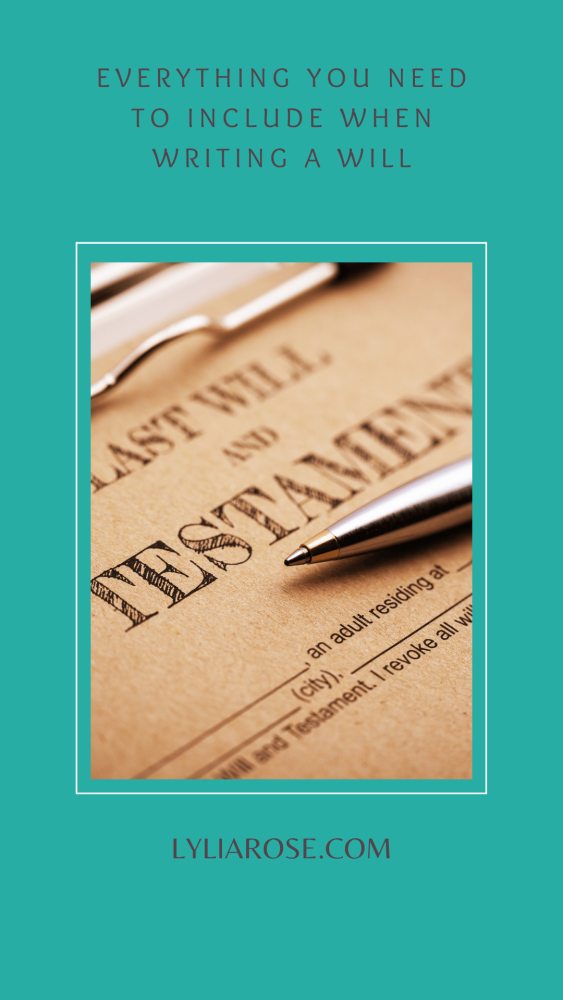Everything You Need to Include When Writing a Will
Posted on
Writing a will may seem like a daunting task, but it's a crucial step in ensuring your assets are distributed according to your wishes after you pass away.
In this post, we'll guide you through everything you need to include in your document of inheritance. By the end of this article, you'll be well-equipped to write your own will as the testator, and have peace of mind knowing that your loved ones will be taken care of in the future.
And, if you're wondering why you should write a will in the first place, then check out my post to learn the importance of writing a will.
Everything you need to include when writing a will
Writing a will can be a difficult and uncomfortable task for many people, but it's also one of the most important things you can do to ensure that your assets and wishes are properly taken care of after you're gone. It's not just something aging parents need to consider, but anyone with assets or children. A will is a legal document that outlines how you want your property and belongings to be distributed among your loved ones, and it can also include important instructions for your funeral and end-of-life care. In this post, we'll cover everything you need to know about writing a will, including the essential elements that should be included to make sure your wishes are carried out.
In this blog post we'll cover:
- What is a will?
- Methods of creating a will
- What to include in your will
- How to structure a will
- Understanding the executor's role
- How to appoint guardians
- What is a trustee?
- What is a beneficiary?
- Witnessing and signing of a will
- Should you contact a lawyer?
First things first: what is a will and why should you write one?
Writing a will is an important step in ensuring that your assets are distributed according to your wishes after your death. It gives you the power to decide who receives your property, money, and other assets, as well as how your debts and taxes should be paid.
In addition to asset distribution, a will can also include instructions for end-of-life care and funeral arrangements, such as whether you want to be cremated or buried, or if you have any specific wishes for your memorial service.
If you do not have a will in place, your assets will be distributed according to the laws of intestacy, which can be complicated and may not reflect your true wishes. This can lead to disputes among family members and loved ones, and it can result in your assets being distributed in ways that you may not have wanted.
Writing a will also provides peace of mind for you and your loved ones. It can help alleviate any stress or confusion that may arise during an already difficult time of grief, and can ensure that your wishes are carried out without any undue delay or complications.
Methods of creating a will: in-person, digital, and will kits
There are various ways to write a will, and the most appropriate method for you will depend on your individual circumstances and preferences. Here are some of the most common ways to write a will:
-
In-person with a lawyer
One of the most traditional ways to write a will is to consult with a lawyer. The lawyer will guide you through the process of writing the will and ensure that it meets all legal requirements. This option can be expensive, but it offers the advantage of personalised legal advice.
-
Digitally with online will-writing services
Online will-writing services are becoming increasingly popular. These services allow you to create a will online, and they often offer templates and step-by-step guidance to make the process easier. This option can be less expensive than using a lawyer, and it can be more convenient since you can complete the process from the comfort of your own home.
-
Using a post office will kit
Some companies provide a post office will kit that you can use to write a simple will. These kits typically include a template, step by step instructions and a completed example making the process quick and easy, but they do not offer any legal advice or guidance. This option can be inexpensive, but it may not be suitable for more complex wills.
-
Handwritten will
It is possible to write a will by hand, but it is important to ensure that it meets all legal requirements. In some jurisdictions, a handwritten will may not be valid, so it is important to check the local laws before choosing this option.
It is important to note that regardless of how you choose to write your will, it is crucial to ensure that it meets all legal requirements and is executed properly. A poorly written or executed will can lead to complications and disputes after your death. Therefore, it may be wise to seek legal advice or at least do thorough research to ensure your will is valid and will be followed as intended.

What to include in your will
Here's what you need to include in your will:
- Your personal details: Start your will with your full name, address, and date of birth. Include the date you are writing the will to prevent confusion in the future.
- The appointment of an executor: An executor is the person responsible for carrying out your wishes as outlined in your will. Choose someone you trust for this role.
- Beneficiaries: List the people or organisations that will receive your assets after you pass away. Include their full names and contact information.
- Guardianship: If you have children under 18 years old, appoint a guardian to take care of them in the event of your passing.
- Specific gifts: If you have specific items you want to leave to certain people or organisations, include them in your will.
- Residuary estate: Your residuary estate includes all assets that are not covered by specific gifts. Outline how you want your residuary estate to be distributed.
- Funeral wishes: Include your funeral wishes in your will, such as whether you want to be buried or cremated and any specific details regarding your funeral service.
You can also include organ donation preferences. It's important to note that all capable citizens above 18 are considered organ donors by default in the UK, unless opted out. For those not yet sure about whether they wish to be organ donors, consult this section for more information. Also, it's crucial to mention that leaving any property unmentioned in the will could result in it becoming the government's property by law if there are no surviving relatives.
How to structure your will
The structure of a will can vary depending on personal preferences and specific circumstances. However, a typical will includes the following sections:
- Identification: Establish and verify your identity as the testator and creator of their own will.
- Revocation: Revoke any previous wills or legal documents related to inheritance.
- Appointments: Appoint an executor, guardians, and trustees as needed.
- Beneficiaries: List all beneficiaries who will receive assets under the will.
- Testimonium and attestation: Sign and date the will, and have it witnessed by two or more neutral individuals.
Understanding the executor's role in a will
The executor of a will is a crucial role that ensures the testator's last wishes are carried out to the letter. This appointed person is responsible for reading the will, interpreting its instructions, and ensuring that the testator's wishes are carried out accurately. The executor will also be in charge of making all necessary arrangements for administering the estate and its assets, as specified in the will.
Typically, the executor is someone the testator trusts and considers to be highly competent. It is common for the executor to be a personal acquaintance of the testator, such as a family member or close friend. However, if a suitable candidate is not available, the testator may appoint an experienced and well-acquainted attorney to act as the executor of the will.
It is important to note that there is no legal restriction barring a beneficiary from being named as the executor of a will. However, it is advisable to appoint a neutral and unbiased executor who will carry out the testator's wishes without any personal interest or conflict of interest.

How to appoint guardians for minors in your will
If you have children under the age of 18, you should appoint a guardian in your will who will be responsible for their care in the event of your passing. There are two guardian roles that can be assigned to the same person or two different individuals, depending on your preference:
- Guardian of the Person: This individual is responsible for making decisions on behalf of the minor beneficiary, including their physical and emotional wellbeing.
- Guardian of the Estate: This person manages and protects the minor's inherited assets until they reach adulthood.
However, there are some circumstances where appointing a guardian may not be necessary, such as when the beneficiary has at least one capable parent. It's also advisable to appoint a secondary guardian in case the primary guardian passes away before the beneficiary reaches adulthood. This requires making arrangements for a trusted individual to assume the guardian's duty.
Who/What is a trustee?
A trustee is a person appointed to manage and protect the assets owned and/or generated by a trust, which is a legal arrangement that allows a third party to hold and distribute assets for the benefit of beneficiaries. If you create a trust for the beneficiaries of your will, then you will appoint a trustee to carry out the instructions in your will regarding the trust. The trustee's responsibilities include managing the assets in the trust, making sure the beneficiaries receive their rightful share, and protecting the interests of the beneficiaries. In most cases, the Guardian of the Estate and the Trustee are the same person. However, they can also be two different individuals, depending on your wishes as specified in your will.
Who/What are the beneficiaries of a will?
Beneficiaries are parties named in your will who will inherit your assets after you pass away. These parties could be individuals, organisations, or charities, and they are designated to receive specific assets, such as property, money, or personal belongings. In other words, they are the inheritors of assets specified in the testator’s last will and testament. It is crucial to mention all beneficiaries and verify their identity beyond all doubt in written text. If there are multiple beneficiaries, it's essential to specify the conditions of their inheritance, such as when they will inherit the assets and under what circumstances. For example, you may specify that your surviving offspring may not inherit your assets before a certain age or before completing certain academic qualifications.

Witnessing and signing of the will
After the testator has written down all the sections to be included in the will, they must sign and date the document. This action must be witnessed and verified by at least two neutral individuals who are not beneficiaries of the same will, as this could create a conflict of interest. The witnesses must observe the testator sign the will without any form of direct or indirect coercion.
The witnesses must also sign the document to confirm their neutral observation of the will's voluntary signing by the testator. While more than two witnesses may be present during the process, only two signatures are necessary. It is important to note that web cam wills do not require the two witnesses to be present in the same room as the testator. Through a webcam, the witnesses only need to have a clear and unobstructed view of the testator signing the will in real time.
Should you contact a lawyer?
While writing a will can be a difficult task, it's essential to ensure that your wishes are properly carried out after you're gone. It's highly advisable to seek assistance from legal professionals for ensuring your will's validity under British inheritance laws. If you're not able to meet a lawyer in person, consider a webcam will, such as those offered by E.L.M Legal Services that will let you write a will from the comfort of your own home.
Final word on everything you need to know when writing a will
Noone knows their fate and death can happen at any time. Ensuring there is a plan in place for assets and minors is an important part of end of life planning for adults of all ages, not just the elderly. Writing a will may seem daunting, but it's a crucial step in ensuring your assets are distributed according to your wishes. By including all necessary information and following proper legal procedures, you can have peace of mind knowing that your loved ones will be taken care of in the future.


